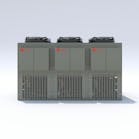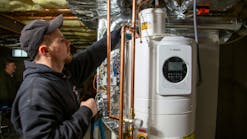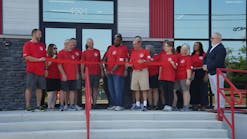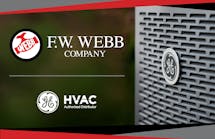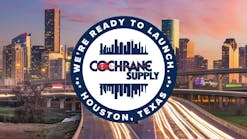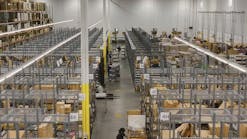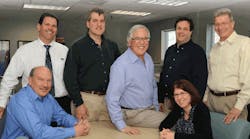When you're an HVACR wholesale distributor with a branch in midtown Manhattan, you have a whole host of challenges that most other distributors don't have to contend with: the traffic (crowded), the parking (scarce), branch size (small) and the rent (don't even ask). But, as Frank Sinatra famously sang in New York, New York, “If I can make it there, I'll make it anywhere.”
Twinco Supply Corp. has made it in New York City — and on Long Island and Queens, too — designing and supplying temperature control systems for HVACR mechanical contractors as well as serving as a distributor for HVACR equipment and parts. Its extensive product offering on both the controls and the HVACR equipment and parts sides, as well as its technical expertise, have separated Twinco from competitors in the New York City and Long Island markets: There's Twinco and then there is everybody else. Hal and Steve Bergman, twin brothers, founded Twinco Supply in 1991 after they left their family's air-conditioning and refrigeration wholesale business to start their own operation. Hal Bergman passed away in 1994 from heart complications.
The Bergmans have had a long history in the HVACR business — Steve Bergman, president of Twinco, notes that their family business dates back to 1929, and he and his brother were the third generation in the industry. Their strong ties to the industry and close relationships with their customers served them well. Starting a business presents some pretty stiff challenges, particularly in the midst of a recession, but Bergman says they quickly established their niche. “We were fortunate that our old customers followed us to our new company,” Bergman says. “We were lucky that Honeywell, Johnson and Westinghouse solicited us right away. Because of our good relations with other vendors, we were able to overcome the obstacles of obtaining distributorships.”
Because the brothers had designed temperature control systems early in their careers and had limited resources, they decided that Twinco would be in the temperature controls business and forgo equipment and accessories. “The major markets that we always serviced were mechanical contractors and service companies, so that's who we concentrated on when we started Twinco,” Bergman says. The Bergmans, along with one employee, Ken Freilich, started in a friend's small space in Farmingdale on Long Island. Three years later, they moved to a 10,000-square-foot facility in Huntington Station, expanding its panel fabrication shop and adding staff, including another control specialist salesperson and expanding into DDC controls.
Twinco's customer base, which was primarily mechanical contractors, was in New York City. While that was only about 30 miles from its Huntington headquarters, the traffic woes made it difficult to service customers in a timely way. If a customer called in an order after 9 a.m., Twinco wouldn't be able to deliver it until the following day, and customers didn't want to waste a day to leave the city and travel to Long Island. By 1997, Bergman realized that he had to expand Twinco to Manhattan, opening a branch operation and counter in Midtown, the heart of the city.
Page 2 of 3
Having a presence in Manhattan has paid off for Twinco in many ways. Not only were they able to be there for customers, but they became reacquainted with many customers from their previous business. Of course, their old customers wanted more than temperature controls from them, so Bergman got back into the replacement and service parts business. “Our old customers expected us to handle these, and our new staff had the experience in these areas,” Bergman says. “They were picking up our controls and they had to go somewhere else to pick up the other parts. Adding this part to our business has really paid off.” Since then, Twinco has added a similar operation in Long Island City, Queens. It's only a few miles from its Manhattan branch, but there's a concentration of customers there as well, which makes it important to be there.
The New York City market is competitive in that Twinco's customers demand fair pricing and excellent service, but Bergman says there are only three or four distributors operating in Manhattan. The high overhead and cost of doing business in New York City eliminated much of the competition, Bergman notes.
Twinco services two related markets: temperature control systems and equipment and service parts. Its temperature control systems, supplied to mechanical contractors, are designed for standalone DDC and electronic projects in the $5,000 to $20,000 range and have exceeded $250,000. With its technical expertise, Twinco is able to provide a variety of value-added services for its projects, including take-off, CAD wiring diagrams, submittals, panel fabrication, programming and field support. With the mechanical contractor providing installation and wiring, it eliminates the need for the automatic temperature control contractor, Bergman says. “This way, the mechanical contractor can break it out and save on a lot of the other things. We give them the support and the diagrams so they're not paying for the whole package.”
Twinco also provides HVACR equipment and service parts to most of its mechanical contractor customers as well as service companies and end users with their own facilities personnel. They keep branches heavily stocked along with dedicated delivery trucks for each branch.
“We pride ourselves on our product offering,” Bergman says. Twinco's largest supplier is Belimo, a manufacturer of end devices, damper actuators and control valves. “We've developed a strong following with customers, engineers and end users,” Bergman says of Belimo's product line. Another niche market for Twinco is motor controls. “We've been with Eaton for several years. We stock combination starters and variable-frequency drives and can modify them in-house.”
Twinco recently acquired the Ducane/Allied Air residential and commercial equipment lines, giving them a full-line offering of split systems and rooftop units. Bergman says Twinco has made a major commitment to bring this equipment into stock along with Friedrich Ductless Split systems and SPX Marley cooling towers weighing up to 126 tons. Twinco also stocks chillers and air handlers along with refrigerants and refrigerant components, copper and fittings.
Twinco's controls business remains a true differentiator. As a Honeywell Applied System Distributor and Johnson Automatic Building Control Specialist specializing in designing, supplying and supporting direct digital control systems, Twinco has made a considerable investment in personnel and training. “This has allowed us to compete in the control business,” Bergman says. Twinco's control product line is extensive, with major manufacturers including Honeywell, Johnson, Belimo, Siemens, Schneider, Invensys, Robertshaw, White Rodgers, Tekmar and Erie.
Motor starters and variable-frequency drives (VFD) have been a growing and profitable market for Twinco. In fact, the VFD market has developed into a retrofit market that provides building owners with energy management benefits. Bergman describes this as a “niche market” that services mechanical contractors that install motor bearing equipment. Having an in-house panel fabrication department — something that Twinco has had since the Bergmans started the company — continues to be another differentiator for the business. “It supports our sales efforts and enables us to provide everything in-house,” Bergman says. “Our ability to supply wiring diagrams and full submittals is key to our specialized services.”
Page 3 of 3
Bergman takes pride in his staff, noting the low turnover and the technical and customer service skills that they bring to their jobs. “The expertise of our staff assures that we supply the best products for the project,” he says. The Twinco sales staff includes five outside salespeople as well as an inside sales staff and counter people in each of its branches, along with warehouse workers and truck drivers. Customer service and sales support, along with accounting and collections, are handled from the Huntington office. Its temperature control technical support staff consists of two panel fabricators, one CAD control wiring diagram designer and one software programming expert who also handles field support with an assistant.
“We try to do the right thing by our employees,” Bergman says, stressing the importance of allowing employees to expand their skills and grow as professionals. Even during the recent economic downturn, Twinco did not cut staff or hours. “We actually gave our people cost-of-living adjustments in 2010 because I thought it was the right thing to do,” Bergman says. He adds that the business weathered the storm by trying to adjust inventories and cut operating expenses. He sees the current market recovering very slowly. After a record year in 2008, Twinco's business was down in 2009 by about 15 to 20 percent; 2010 was relatively flat, he says.
The relationships the Bergmans had formed in their previous business — their relationships with customers, suppliers and other HVACR distributors — are a critically important element for Twinco today.
On the customer side, the company has built its relationships by knowing that Twinco is there for this job and all jobs going forward. Most of Twinco's customers are small, family-run businesses that also value those relationships. “It's continuous and it's about getting the trust of customers who rely on us to do the right thing for them,” Bergman says. “When you have those relationships, it takes price out of the picture.”
While Twinco used to market to customers through direct mail, they are now using Constant Contact, an e-mail marketing solution, as a way to stay in touch with current and potential customers. Twinco also hosts an annual product expo and off-site seminars that increase its exposure to all facets of the industry. Word-of-mouth remains one valuable way to build the business. “We have acquired many new customers when technicians and office personnel change employers and bring us along,” Bergman says.
On the supplier side, Bergman tries to maintain a close relationship with most of his suppliers. That means attending trade shows as well as making sure that the lines of communication remain open when issues arise. Twinco's membership in Blue Hawk and Controls Group North America also strengthens the distributor-supplier relationship, he says. “We pride ourselves in the loyalty and support that we give our vendors and feel that these relationships facilitate resolution of issues.”
Twinco's involvement in HARDI strengthens the relationships with the industry and other HVACR distributors. Bergman was actively involved in NHRAW and ARW, finding networking opportunities with other distributors and suppliers to be beneficial to him personally and professionally. When HARDI was formed, Bergman was asked to serve as mid-Atlantic director, a position he continues to hold. He also serves on HARDI's board of directors.
“I enjoyed getting involved in organizing the regional meetings and learning more about the HARDI organization,” he says. Bergman has been particularly impressed with HARDI's involvement in national HVACR issues and its advocacy on behalf of distributors. Bergman encourages others within Twinco to participate in HARDI activities. “My goal is to have all of my employees take advantage of the new Distributor Learning Network and have my company participate in some of the other programs.”
Michael Maynard is a business writer based in Providence, RI, who writes on issues related to HVACR, construction and architecture. Contact him at [email protected].
Best Practice
Executive training and coaching that utilizes a professional facilitator, expert educational speakers and a peer group of 12 other business owners from noncompeting companies.
Definition and Example: Twinco is a member of Vistage, participating in one CEO group and two different key groups for top management.
Significance: Experienced lecturers coach us, and also have the opportunity to discuss our issues and give and get suggestions on how to resolve them.
Benefits: This program enables us to gain exposure to a different learning and training experience, expanding on our own management leadership skills and benefiting from that of others.
Procedure: Our facilitator or chair is Hal Cherney, who is responsible for organizing the groups and scheduling speakers from Vistage's extensive speaker group.
People Involved: Steve Bergman, Ken Freilich, Glenn Gorelik.
Timing: Each group meets one full day a month off-site with a speaker in the morning and a group discussion in the afternoon. The CEO membership also includes a two-hour one-on-one session with the facilitator, who functions as a consultant.
Cost: The total cost is about $25,000 per year.
Other Considerations: Vistage members have access to a website that serves as a resource for many personal and business topics.
Contact: Steve Bergman at 631/547-1100, [email protected].
